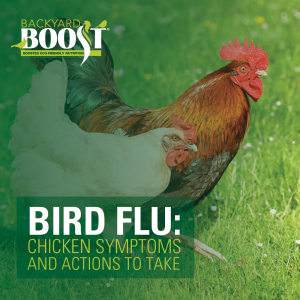
Backyard chickens are generally pretty hardy birds. Especially in winter after they’ve undergone molting. However, they can be susceptible to extreme cold temperatures, so it pays to prepare. But, you may be wondering, how cold is too cold for chickens?
If you’re looking to add a feathery friend to the family, it’s important to understand how a chicken might react to the climate you call home. That’s why the Backyard Boost® team whipped up this guide to help you better care for the birds in your life.
So, How Cold Is Too Cold for Chickens?
How cold is too cold for chickens? It’s a complicated question, that varies from breed to breed. That said, most chicken breeds can tolerate temperatures down to about 0°F (-18°C) as long as they are healthy, well-fed, and properly acclimated to the cold weather. Yes, those fresh feathers also help keep them warm.
However, prolonged exposure to temperatures below -20°F (-29°C) can be dangerous, especially if chickens are not provided with adequate shelter and protection from the wind and moisture.
Factors That Impact Cold Tolerance
Like anything, there will be factors that impact whether your beautiful birds can tolerate the cold. Breed makeup, adequate housing, bedding, and diet are a few of the factors that will help answer how cold is too cold for chickens.
Breed
How cold is too cold for chickens? As we mentioned above, some breeds are more adaptable to diverse climates than others. For example, breeds with smaller combs and wattles are less likely to experience frostbite.
Some chicken breeds that are cold tolerate include:
Shelter
Providing a well-insulated, draft-free, and well-ventilated chicken chicken coop is vital. Chickens need a dry, wind-protected environment to stay warm.
Bedding
Deep bedding such as straw or pine shavings helps to insulate the coop floor and provide warmth.
Diet
Extra calories from higher protein feed can help chickens generate more body heat. Make sure they have access to clean, fresh water that isn’t frozen. It is important to check their water source daily or several times a day in extreme cold.
Roosts
Chickens should have roosting bars where they can huddle together. Roosting bars allow them to share body heat and keep their feet off the cold ground. Frozen feet are often one of the biggest challenges for keeping chickens.
Be Aware of these Health Considerations
Frostbite
Watch for signs of frostbite in chickens. Frostbite is common on combs, wattles and feet. It can occur when there is prolonged exposure to cold and moisture, so keeping their coop dry and warm is the best prevention.
Stress
Cold stress can weaken chickens’ immune systems, making them more susceptible to illness. Watch for signs of sickness if your flock has been exposed to long periods of cold.
Keeping your Feathered Friends Protected from the Cold
As colder temperatures move in this winter, it is best to take a proactive approach to preparing your flock and protecting them from the elements. Then, you won’t have to answer, “How cold is too cold for chickens?”
You likely started your backyard chicken flock in the spring, when the sunshine was plentiful and the days were long. How will you keep your feathered friends healthy and producing during the chilly winter months?
Shelter
You’ve already provided them with a coop, but you might need to make a few modifications to get it winterized for your birds. Although when you think of providing warmth, you think of secure structures; however, you will want your coop to have some ventilation or air movement. Otherwise, the humidity from the chickens’ own body heat can cause frostbite from the moisture. The lack of ventilation can also cause ammonia build-up, which can damage the birds’ respiratory systems.
To provide adequate ventilation, provide a screened-in gap between the roof and the side of the coop. If you have windows, put screened windows in to allow for air movement. You can close the windows at night when temperatures tend to get even colder.
If space allows and you are concerned about your chickens’ spending time outside, you can build them a sunroom of sorts. Cover their run with clear plastic, which will stop the wind and absorb the sun’s heat.
Heat
Your chickens have a natural heat source – their own feathers! They will ruffle their feathers and will huddle close to one another in the coop to stay warm. They don’t like to have wet feet or cold feet, so be sure to use plentiful bedding within the coop to keep the floor dry.
Unless there is an unusual cold snap predicted for your area, try to avoid heat lamps or heaters of any sort. Heat bulbs and heaters cause a fire hazard when they are too close to the dry bedding or structure. Too much heat can lead to a fire, destroying the coop and the lives inside.
Be sure to have plenty of roosting bar space 2-3 feet above the ground. Chickens will want to roost high enough to be off the damp ground to stay warm. It is also on the roosting bar, where they will ruffle their feathers together during the night to share their body heat with one another.
Although the next tip doesn’t really provide them with heat, it will help them avoid frostbite. Apply petroleum jelly (think Vaseline) to their wattle and comb – basically any red skin on their face – to avoid frostbite. Apply it generously, avoiding their eyes. If it has turned black, it likely has already been frostbitten. Keep applying during the cold temperatures.
Light
Although we discourage heat bulbs, for warmth, light is of utmost importance to your birds if you want to continue to receive eggs during the shorter days. After the birds molt in late fall, some breeds have a harder time laying at least one egg per day due to the shortened days.
To help the birds think the days are longer, a simple 40-watt bulb in a reflector shade hangs from the ceiling so the entire coop receives good lighting. An additional light might be needed to spark the interest of the chickens back into egg production.
Feed & Water
Just like the rest of the year, feed and water are essential to the chicken’s growth, maintenance and egg production. Continue to feed them daily, providing them a nutrient-rich supplement like Backyard Boost® Daily Essentials, a pelleted protein supplement for poultry designed to maximize digestibility and egg production. The added protein helps replenish and nourish your chicken during this time and keeps them warm.
Backyard Boost Daily Essentials can be mixed in with the chicken feed, preferred in the winter, or scattered on the ground for easy pecking.
Backyard Boost Daily Essentials:
- Contains AO-Biotics® Amaferm®, a prebiotic research-proven to enhance digestibility.
- Contains AO-Biotics® EQE, a postbiotic research-proven to enhance egg quality.
- Provides nutrients needed for overall well-being.
Amaferm enhances digestibility. If that sounds unclear, It boosts the digestive system of your chickens, supporting the overall nutrition of the flock. Better-fed chickens are healthier chickens.
Water is the most essential nutrient for any living being. Make sure that your chickens’ water doesn’t contain ice each morning and evening. You can also purchase an electric, heated waterer to keep the ice off of the water. Either way, you will want to provide your birds with fresh water daily.
Why Backyard Boost?
Backyard Boost is a line of products purposefully crafted to support the well-being of birds. Not only do we care about keeping them warm in the coldest months of the year, but we also care about them year-round.
The added protein in Backyard Boost Daily Essentials, combined with Amaferm and AO-Biotics EQE will keep your hens healthy and performing. We know that healthy hens are happy hens, and happy hens lead to happy hen owners – you!
More about EQE
EQE, or Egg Quality Enhancer, is the first and only research-proven postbiotic on the market. It has three primary benefits:
- More sellable eggs
- Improved egg mass
- Increased productive life span
Other Backyard Boost Options
Backyard Boost offers two other products for backyard chicken hen-thusiasts, Backyard Boost® Defense, and Backyard Boost® Busy Balls.
Backyard Boost Defense
Backyard Boost® Defense is a liquid supplement for poultry designed to support digestion and healthy immune response. It also contains Amaferm and nutrients needed in times of stress. It promotes water intake and hydration.
Backyard Boost Busy Balls
Backyard Boost® Busy Balls are a prebiotic treat to bounce your birds’ boredom. They contain Amaferm and provide digestive support for overall well-being. The balls help alleviate boredom, which often leads to undesirable behaviors. They would be a great treat to put out on a sunny winter day.
Is It Too Cold for Chickens?
Time flies when you’re having fun, and Old Man Winter can do real damage to your flock if you’re not prepared. Make sure your backyard birds are protected from the extreme cold by taking some proactive measures before the temperatures drop. Keep them dry and comfortable, provide ventilation and proper nutrition, and they should thrive in the winter.
Get your Backyard Boost Today!
Now that you know how cold is too cold for chickens, prep for winter weather with Backyard Boost Daily Essentials. Boost your flock’s protein to help keep them healthy and performing, no matter the temperature. Get your hands on industry-leading backyard chicken supplements now!
Ordering Backyard Boost is simple: purchase via our online store or from one of our online retail partners.
Perhaps you prefer to shop in person. Our Where to Buy tool can help you find the BioZyme retailer closest to you.
Stay In the Know
New to keeping a flock and looking for more educational resources? Use our Chicken Care Cycle as your guide to all things backyard chicken care. Or, if email is more your speed, you can sign up for our regular e-newsletter. That will help you stay up to date on all our informational blogs, educational resources, and great product deals!

